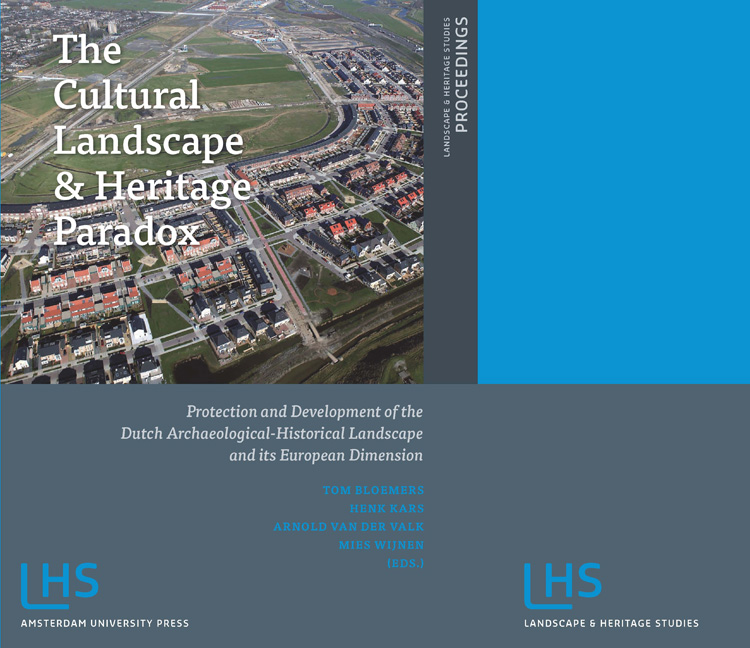 The Cultural Landscape and Heritage Paradox
The Cultural Landscape and Heritage Paradox Book contents
- Frontmatter
- Contents
- Preface
- I INTRODUCTION
- II INSIGHTS AND PROSPECTS OF ARCHAEOLOGICAL-HISTORICAL LANDSCAPE STUDIES
- III LINKING KNOWLEDGE AND ACTION
- IV IMAGINATION - FACTS AND CONSTRUCTIONS
- V SHARING KNOWLEDGE - STORIES, MAPS AND DESIGN
- VI SYNTHESIS AND CONCLUSIONS
- VII MANAGEMENT OF KNOWLEDGE
- VIII AGENDA FOR THE FUTURE
- IX SUMMARY
- X APPENDIX
- Subject Index
- Index of Places and Regions
4 - The Potential of Remote Sensing, Magnetometry and Geochemical Prospection in the Characterization and Inspection of Archaeological sites and Landscapes in the Netherlands
Published online by Cambridge University Press: 21 January 2021
- Frontmatter
- Contents
- Preface
- I INTRODUCTION
- II INSIGHTS AND PROSPECTS OF ARCHAEOLOGICAL-HISTORICAL LANDSCAPE STUDIES
- III LINKING KNOWLEDGE AND ACTION
- IV IMAGINATION - FACTS AND CONSTRUCTIONS
- V SHARING KNOWLEDGE - STORIES, MAPS AND DESIGN
- VI SYNTHESIS AND CONCLUSIONS
- VII MANAGEMENT OF KNOWLEDGE
- VIII AGENDA FOR THE FUTURE
- IX SUMMARY
- X APPENDIX
- Subject Index
- Index of Places and Regions
Summary
ABSTRACT
This paper summarizes the findings of three studies dealing with the application of remote sensing techniques, magnetometry and geochemical prospection in Dutch archaeology. The section on remote sensing presents a short study based on a literature review and on interviews with specialists and stakeholders in the field of heritage management. It is concluded that remote sensing techniques are widely applicable in different landscapes in the Netherlands and offer great opportunities; however, so far their application in modern prospective archaeology is mainly restricted to the use of digital elevation models.
The study on magnetometry is, in addition to the measurement of the magnetic susceptibility of many soil samples, based on a magnetometer survey of 31 sites in order to perform an assessment of the use of magnetic methods for locating and mapping archaeological sites. Areas in different geogenetic environments in the Netherlands were identified where use of the method will be successful and the method should therefore be added to the toolkit of the archaeological prospector.
The section on geochemical prospection presents, in addition to literature reviews, the application of state of the art techniques for the recognition of inorganic and organic chemical fingerprints in archaeological soils. The investigations showed that even in densely occupied areas with soils containing subrecent to modern anthropogenic signals, archaeological soils and features could be determined. The analysis of soils using mass spectrometer proteomics showed that proteinaceous matter reflects the presence of keratin which probably derives from ancient hair and skin. It is argued that the use of biomarkers in archeological prospection is a challenging subject for future research.
It is concluded that, in sharp contrast to field surveys, coring and test trenching, the described nondestructive techniques are only rarely used in archaeological prospection in the Netherlands. One reason might be the lack of a master's degree programme in prospective archaeology at Dutch universities. Another reason often mentioned is that these methods are not cost-efficient, which might be true for advanced geochemical prospection techniques but does not hold for magnetometry and remote sensing methods. A third reason might be the argued reliability of these methods; however, despite their restrictions they have proved to be very useful in other countries.
- Type
- Chapter
- Information
- The Cultural Landscape and Heritage ParadoxProtection and Development of the Dutch Archaeological-Historical Landscape and its European Dimension, pp. 415 - 430Publisher: Amsterdam University PressPrint publication year: 2010
